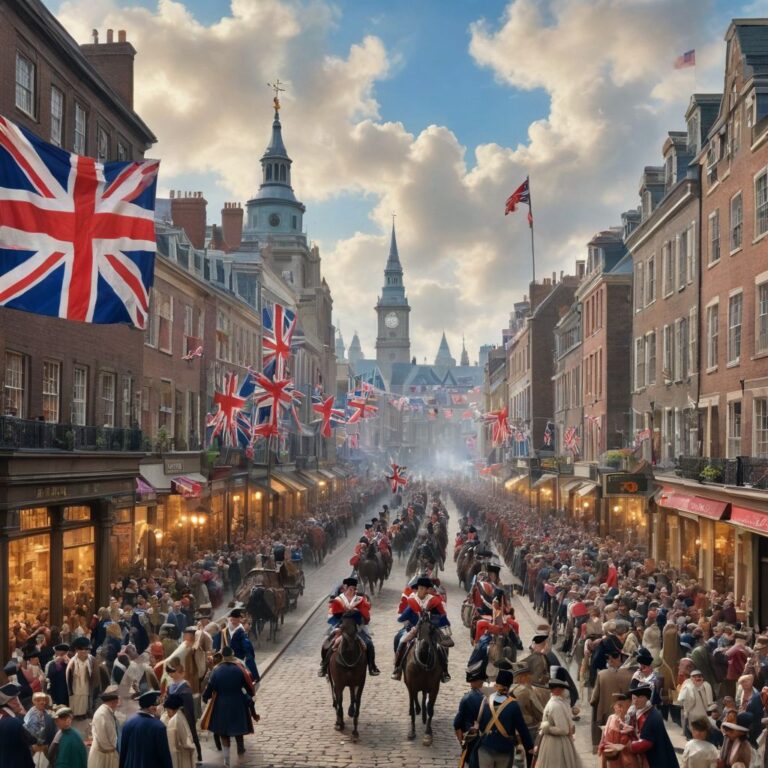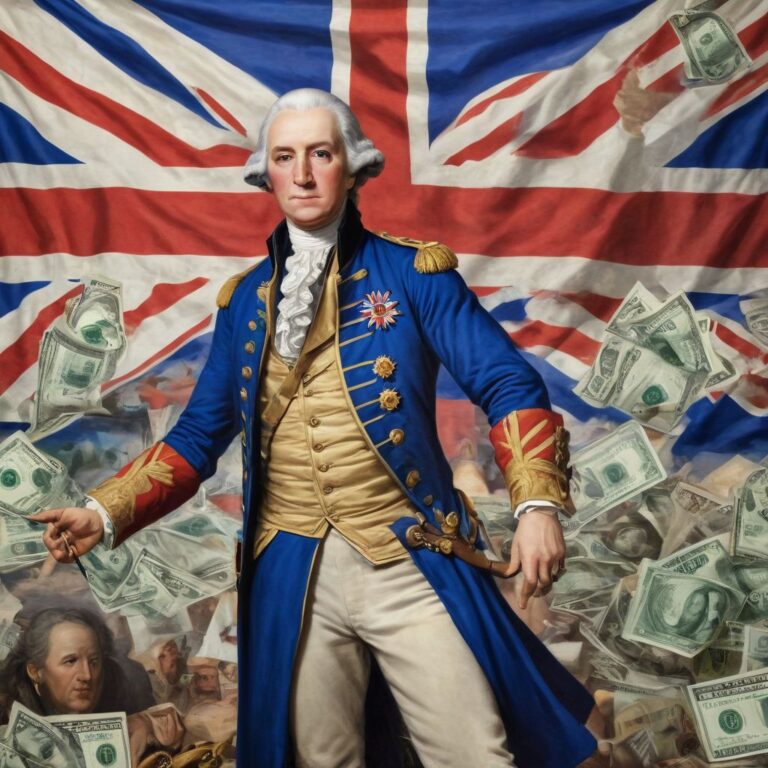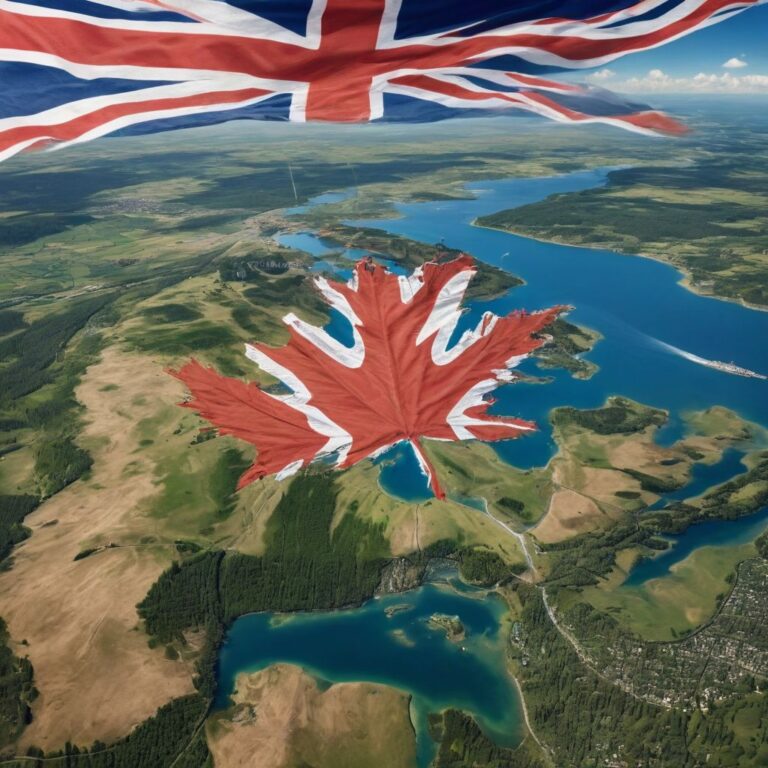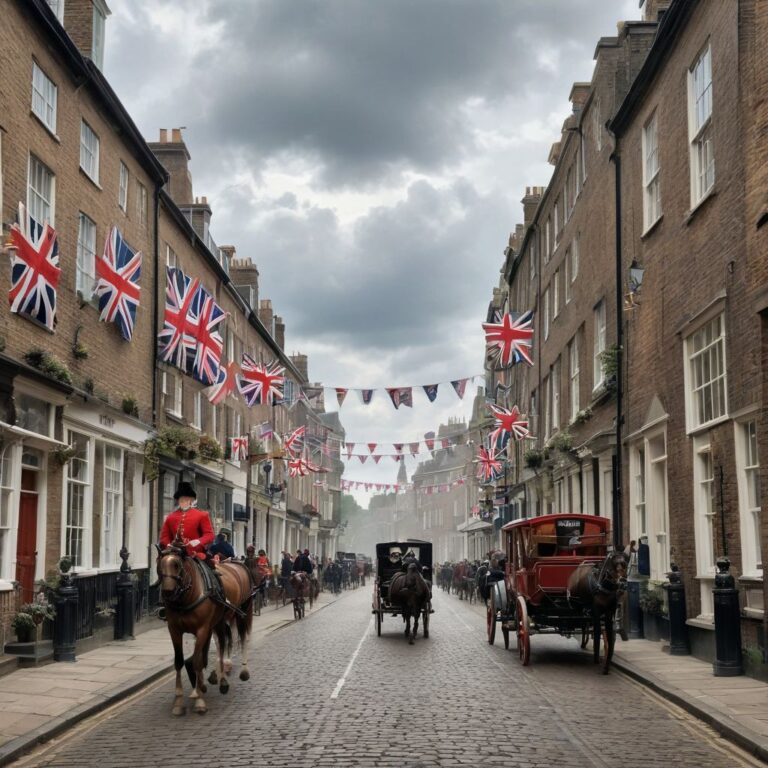Imagine a world where the rockets’ red glare and bombs bursting in the air were never a symbol of American defiance but rather a footnote in a failed rebellion. Picture a reality where the “Star-Spangled Banner” wasn’t the anthem of a new nation but a forgotten ballad of a lost cause. What if the British had won the Revolutionary War?
The American Revolution, a defining moment in world history, wasn’t just a war over taxes and tea. It was a clash of ideologies, a struggle for self-determination, and a catalyst for the spread of Enlightenment ideals. The thirteen colonies’ fight for independence from the mighty British Empire ignited a global movement that reshaped liberty and governance. But what if the outcome had been different? What if the redcoats had prevailed, and the nascent United States had never come into being?
The consequences of such an alternate history are staggering to contemplate. It’s not just about who won or lost a war; it’s about fundamentally reshaping political landscapes, economic systems, social structures, and cultural identities. The ripple effects of a British victory would have extended far beyond the shores of North America, potentially altering the course of global events for centuries to come.
In this deep dive into alternate history, we’ll explore the critical turning points of the Revolutionary War, where the British could have achieved victory, the immediate and long-term consequences of such an outcome, and the potential cultural and technological differences that would have emerged in a world where the British Empire maintained its grip on North America. We’ll also address criticisms of this counterfactual scenario and delve into the fascinating “what ifs” that spark our imagination and challenge our understanding of history.
So, buckle up and prepare to embark on a journey through time and possibility, where the familiar narrative of American independence is replaced by a captivating exploration of what might have been.
Key Turning Points in the Revolutionary War That Could Have Led to British Victory

The American Revolution was a hard-fought conflict, with numerous battles and strategic decisions shaping its outcome. However, several key turning points could have swung the pendulum in favor of the British, forever altering the course of history.
- The Battle of Saratoga (1777): This pivotal battle is often considered the turning point of the war, as it led to France’s official entry on the side of the Patriots. Had the British secured a decisive victory at Saratoga, it could have deterred French intervention, depriving the colonists of crucial military and financial support. A more substantial British presence in the northern colonies could have also isolated New England, a hotbed of revolutionary fervor.
- Early Loyalist Support: While the Patriots ultimately garnered widespread support, Loyalist sentiment was initially significant, especially among wealthy merchants, Anglican clergy, and recent British immigrants. Had the British capitalized on this early Loyalist base, offering them more excellent political representation and protection, they could have potentially divided the colonies and weakened the Patriot cause. A more robust Loyalist militia could have bolstered British forces and disrupted Patriot supply lines.
- Southern Strategy: The British initially focused on the northern colonies, where Patriot support was most robust. However, a more aggressive and earlier implementation of their Southern Strategy, targeting Loyalist strongholds and exploiting social divisions, could have shifted the war’s momentum. Successfully occupying key southern ports and cities might have cut off vital resources and demoralized the Continental Army.
- Naval Dominance: The British Navy was a formidable force, but its impact was not always fully realized during the war. A more effective maritime blockade of American ports, combined with strategic raids on coastal towns and cities, could have weakened the colonial economy and disrupted trade, making it difficult for the Patriots to sustain their war effort.
- Leadership and Strategy: While George Washington proved to be a resilient and resourceful leader for the Patriots, alternative scenarios could be imagined. A different British commander, one more adept at counterinsurgency tactics or more willing to compromise with moderate colonial factions, could have quelled the rebellion. Similarly, a less unified or decisive Continental Congress could have hampered the Patriot cause, leading to internal divisions and a weaker war effort.
These potential turning points could have led to a British victory in the Revolutionary War. By exploring these alternate scenarios, we can gain a deeper appreciation for the complexities of history and the myriad factors that shape the course of events.
Immediate Consequences of a British Victory in the Revolutionary War

In the wake of a triumphant British campaign, North America’s political, economic, and social landscape would have been dramatically transformed. The dream of an independent United States would be extinguished, leaving the colonies under the continued rule of the British Empire.
Political Landscape: A Loyalist Stronghold
With the Patriot cause crushed, Loyalist factions would ascend to positions of power and influence. Figures like Thomas Hutchinson, a staunch defender of British authority, might have become governors or held critical positions in colonial administrations. A renewed emphasis on loyalty to the Crown and adherence to British laws and customs would mark the political atmosphere.
However, having learned a costly lesson, the British government might have been more inclined to offer concessions to appease the remaining discontent. This could have resulted in increased representation for the colonies in Parliament, albeit within the confines of the British system. Such a move could have temporarily appeased some colonists. Still, the underlying tension between colonial aspirations for self-governance and British imperial control would likely have persisted.
Economic Impact: Mercantilism’s Continued Grip
Economically, a British victory would have meant the continuation of mercantilist policies, which sought to maximize the wealth and power of the mother country at the expense of the colonies. Trade restrictions, tariffs, and regulations would have continued to stifle colonial economic development, hindering the growth of industries and limiting access to foreign markets.
Westward expansion, a key driver of American growth and prosperity, would have been significantly curtailed. With the British Empire controlling vast territories west of the Appalachian Mountains, colonial settlers would have faced stricter westward migration and land acquisition limitations. This would have impacted not only the colonies’ economic development but also their relationship with Native American tribes, potentially leading to different patterns of conflict and cooperation.
Social Implications: Slavery and Enlightenment Ideals
The social fabric of colonial society would also have been affected. Slavery, while already a contentious issue, might have persisted longer under British rule. The British Empire had a mixed record on slavery, with abolitionist movements gaining momentum in the late 18th century. However, a continued British presence in North America could have delayed or altered the trajectory of the abolitionist movement, potentially leading to a different timeline for the emancipation of enslaved people.
Furthermore, the Enlightenment ideals of liberty, equality, and self-determination that fueled the American Revolution would have faced significant setbacks. While these ideas would not have disappeared entirely, their expression and influence would likely have been curtailed under a more conservative and hierarchical British regime. A different set of values and priorities would have shaped the development of American political thought and cultural identity.
Long-Term Ripple Effects of a British Victory in the Revolutionary War
The ramifications of a British triumph in the Revolutionary War would have reverberated far beyond the immediate aftermath, potentially shaping the geopolitical landscape of North America and influencing global events for centuries.
North America: A British Dominion
Without the United States, North America would have remained a dominion of the British Empire. The colonies, united under a confederation or individual entities with varying degrees of autonomy, would have been integrated into the vast network of British territories. This would have significant implications for territorial claims, political alliances, and the development of national identities.
Relations with Canada and Mexico would have taken different trajectories. Instead of a border with the United States, Canada might have shared a more complex boundary with a collection of British colonies, potentially leading to different trade patterns, migration, and cultural exchange. Similarly, relations with Mexico, which gained independence from Spain in 1821, would have been shaped by a dominant British power in North America, potentially leading to different alliances and conflicts.
The development of democratic ideals and institutions, a hallmark of the United States, would also have been impacted. While the British system had democratic traditions, the absence of a revolutionary break from the monarchy might have led to a slower and more gradual evolution of democratic governance in North America. The balance of power between the executive, legislative, and judicial branches could have looked quite different, with potential implications for individual liberties and social justice movements.
Global Impact: A Shifting Balance of Power

The global impact of a British victory would have been equally profound. The French Revolution, a seminal event that reshaped European politics and inspired revolutionary movements worldwide, might have unfolded differently without the American example and French support for the Patriot cause. A weakened France, still grappling with the financial burdens of aiding the American rebels, might have been less able to resist internal pressures and external threats.
The rise of other global powers, such as Spain and Russia, could also have been affected. These nations faced different geopolitical challenges and opportunities without the United States counterbalancing British power. The scramble for colonial possessions and spheres of influence could have taken various forms, potentially leading to other alliances, conflicts, and global trade patterns.
The wave of decolonization that swept across the globe in the 20th century might also have been delayed or altered. The absence of a successful American Revolution, often seen as a model for anti-colonial struggles, could have discouraged or delayed independence movements in other parts of the British Empire and beyond. The geopolitical landscape of the 20th and 21st centuries could look vastly different, with the British Empire potentially maintaining a more prominent role on the world stage.
Cultural and Technological Differences in a World Where the British Won the Revolutionary War

In North America, still under the dominion of the British crown, the cultural and technological landscape would have evolved quite differently. Instead of the distinct American identity that emerged from the revolution, a unique “British-American” hybrid would likely have developed, blending elements of both cultures.
Literature and Art: A Fusion of Influences
A continued influx of British ideas and styles would have shaped the literary and artistic landscape. Think of it as a fascinating fusion of Shakespearean drama, Romantic poetry, and Enlightenment philosophy with the emerging voices of colonial writers and artists. Instead of iconic figures like Benjamin Franklin and Thomas Jefferson, we might have celebrated the works of Loyalist poets and playwrights, or perhaps even a British-American equivalent of Charles Dickens, chronicling colonists’ lives navigating the complexities of a transatlantic empire.
National narratives would be vastly different. Instead of stories of revolutionary heroes and the birth of a nation, there would be tales of colonial loyalty, struggles for representation within the British system, and perhaps even a romanticized nostalgia for a bygone era of imperial grandeur. The art scene might feature portraits of British monarchs and colonial governors, landscapes depicting the vastness of the British Empire, and genre paintings showcasing the daily lives of colonists within a hierarchical society.
Technology and Innovation: A Different Pace of Progress

The technological advancements that propelled the Industrial Revolution might have followed a different trajectory in British North America. Without the impetus of independence and the drive to establish a distinct national identity, the colonies might have been slower to embrace industrialization. Alternatively, with its vast resources and global reach, the British Empire could have accelerated technological development in the colonies, focusing on industries that complemented the imperial economy.
The priorities and perspectives of the British Empire would have influenced scientific discoveries and innovations. For instance, research and development might have focused on improving agricultural techniques for cash crops, enhancing naval technology for imperial expansion, or exploring natural resources in the vast territories under British control. While some scientific advancements might have been similar to those in our timeline, the emphasis and application of these discoveries could have diverged significantly.
The absence of a unified American republic might also have impacted the development of communication and transportation networks. Instead of a nationwide infrastructure designed to connect a sprawling nation, we might have seen a more fragmented system focused on facilitating trade and communication within individual colonies and with the mother country. This could have had long-term implications for developing regional identities and economic disparities.
Criticisms and Counterarguments to the “What If British Won Revolutionary War” Scenario

The notion of a British victory in the Revolutionary War is not without its critics. Some historians argue that American independence was inevitable, given the colonies’ growing economic and political power, their vast distance from Britain, and the colonists’ burgeoning spirit of self-determination. They contend that even if the British had won the war, the underlying tensions and grievances that fueled the revolution would have eventually resurfaced, leading to independence through other means.
Furthermore, some critics argue that the revolutionary ideals of liberty, equality, and self-governance were too deeply ingrained in the American psyche to be extinguished by a British victory. These ideals, inspired by Enlightenment thinkers and the experience of self-governance in colonial assemblies, might have found alternative channels of expression, even under continued British rule.
This could have manifested in political movements advocating for greater autonomy, social reforms challenging hierarchical structures, or cultural expressions celebrating colonial identity and aspirations.
However, counterarguments to these criticisms also exist. Some historians suggest a gradual path to independence within the British Empire was possible, similar to the evolution of dominions like Canada and Australia. In this scenario, the colonies might have eventually achieved high self-governance while remaining part of the British Commonwealth. This would have required significant concessions from the British government and a willingness of colonial leaders to compromise on specific issues.
Another counterargument is that even if a British victory had delayed American independence, it would not have prevented it entirely. The economic and political forces that drove the colonists towards independence would likely have continued to operate, albeit under different circumstances. A new generation of leaders, inspired by the revolutionary ideals of their forefathers, might have emerged to challenge British rule in the 19th or 20th centuries.
Ultimately, the debate over the inevitability of American independence and the potential for alternative paths within the British Empire is complex and nuanced. There are no easy answers, and the historical record provides ample evidence to support both sides. However, by engaging with these criticisms and counterarguments, we can deepen our understanding of the forces that shaped the course of history and the enduring power of ideas like liberty, equality, and self-determination.
Conclusion: The Enduring Power of “What If”
The scenario of a British victory in the Revolutionary War serves as a compelling thought experiment. It forces us to confront the fragility of historical events and the multitude of factors that shape our world. It challenges us to question our assumptions about the inevitability of American independence and the universal applicability of democratic ideals.
By delving into this counterfactual history, we gain a deeper appreciation for the complexities of human motivations, the unpredictable nature of conflict, and the enduring power of ideas like liberty, equality, and self-determination. We also realize the importance of studying alternative histories, not as a means of escaping reality but as a way to better understand it.
The “what if” of a British victory in the American Revolution reminds us that history is not a predetermined path but a tapestry woven from countless threads of choice, chance, and circumstance. It encourages us to consider the roads not taken, the possibilities that never came to pass, and the potential consequences of even the slightest alterations to the course of events.
So, as we ponder the question of “What if the British won the Revolutionary War?” we are ultimately led to a more profound inquiry: What forces shape our reality, and what are the alternative possibilities hidden within the fabric of time? The answers to these questions may not be easily found. Still, the journey of exploration is rewarding, enriching our understanding of the past, present, and future.
FAQ Section:
Q: What if the British won the Revolutionary War?
A: This article explores that question, delving into the potential political, economic, social, and cultural consequences of a British victory. It examines how a different outcome to the war would have reshaped North America and potentially impacted global events.
Q: Could the American colonies have eventually gained independence even if the British won the war?
A: While a British victory would have significantly altered the path to independence, alternative paths could have emerged. The article explores possibilities like a gradual path to independence within the British Empire, similar to Canada or Australia, or the emergence of new independence movements later in history.
Q: How would a British victory have affected global events like the French Revolution?
A: The loss of American colonies weakened France’s position, potentially impacting the course of the French Revolution and other global events. The article discusses potential ripple effects on the worldwide balance of power and the rise of other nations.
Q: What key turning points in the Revolutionary War could have led to a British victory?
A: The article identifies and analyzes several pivotal battles and strategic decisions, such as the Battle of Saratoga and the British Southern Strategy, that, if they had unfolded differently, could have resulted in a British victory.
Q: Are there any criticisms or counterarguments to the “What if the British won the Revolutionary War” scenario?
A: Yes, the article acknowledges and addresses potential criticisms, such as the inevitability of American independence, and explores alternative possibilities within the counterfactual framework. It highlights the importance of considering different perspectives and interpretations of history.


